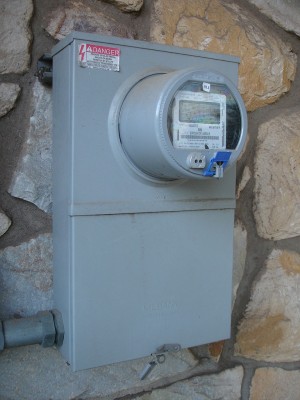Better data means better service… or at least, that’s what the energy companies and some environmentalists are insisting. Skeptics, however, are concerned that the devices pose several risks (including fire hazards and data vulnerability). What are the real advantages of smart meters, and can the possible advantages outweigh the potential risks?
 Smart meters, much like traditional energy monitors, alert users as to how much power they are using over the course of the day. Inside each smart meter device is a SIM card enabling it to relay information back to utility companies, sharing information about which devices are at use in your home and when. Theoretically, this knowledge could inform power companies of when the television is playing, when a baby monitor has been switched on, or even when the lights in the bathroom are in use. And while extraneous data may not be directly significant to energy producers, there is some concern about what third parties could do with this information.
Smart meters, much like traditional energy monitors, alert users as to how much power they are using over the course of the day. Inside each smart meter device is a SIM card enabling it to relay information back to utility companies, sharing information about which devices are at use in your home and when. Theoretically, this knowledge could inform power companies of when the television is playing, when a baby monitor has been switched on, or even when the lights in the bathroom are in use. And while extraneous data may not be directly significant to energy producers, there is some concern about what third parties could do with this information.
There are currently about 46 million smart meters in place in the United States today — meters that use wi-fi to relay usage data back to energy providers. And while advocates insist that the new smart grid interface will enable consumers to make more informed choices about their power consumption, critics are a little uncomfortable with the idea of their personal information being made that easily accessible.
While helping utilities provide a smarter form of service, the subsequent release of all this new data makes many consumers wary – which is exactly why international privacy campaigners are hoping to block the implementation of smart energy meters in homes. And let’s be real: there are murmurs about radiation, but it’s the fear of fraudulent use and compromised data safety that present the biggest concerns. On a personal level, having your family’s meter hacked could result in a loss of important personal information. Nationally speaking, if the entire country’s smart meter network were to go down, the results could be catastrophic. A criminal cyber attacker could plausibly see the smart electrical grid as a prime target, and a nation without power is a nation vulnerable to attack.
Data theft is of course one issue, but there have also been other concerns voiced. For instance, Canadian energy officials have ordered the removal of 5,400 smart meters throughout Ontario, siting fire hazards. In the United States, several people claim to have been harmed by the electromagnetic field from the meters, and they have filed class action lawsuits. However, smart meter creators insist that the radiation emitted from these devices is far less than that which emanates from our cell phones. And while energy regulators in Maine have officially ruled that smart meters don’t present biological threats, Maine denizens are hardly convinced.
Whether or not smart meters are a viable (or desirable) long-term solution to the problem of conspicuous consumption, there’s little question that real-time examinations of energy use could benefit us all. For example: if meter-vigilant users are able to stop using power-sucking devices, such as washing machines, at peak times of day, they can, advocates suggest, potentially save up to 20 or 30 percent on their utility bills. Beyond displaying home energy use, smart meters also enable users to adjust their thermostat or turn off appliances remotely, while also automatically contacting electrical service providers in the instance of a blackout.
The question is: how do we collect that data without it landing in the wrong hands? As it seems that the large scale implementation of smart-meter technology is inevitable, it’s ultimately up to consumers to ensure that, while keeping an eye on their energy use, personal security remains a top priority. Right now, the U.S. Department of Energy is finishing a code of conduct that will govern data privacy laws relating to smart meters. Ultimately, if the meters are properly secured, many still believe they will be beneficial for households, and as American homes and businesses become increasingly connected to the Internet of Things, incorporating greater numbers of technological devices into their daily energy demands, it’s clear that utilities providers must also adapt.
Photo Credit
Smart Meter – Wikimedia Creative Commons
Guest Author Bio
Kate Voss
 Kate Voss is a freelance entertainment writer from Chicago who loves restoring antique furniture. Her most recent project was upcycling her mother’s old trunk to be used as a coffee table.
Kate Voss is a freelance entertainment writer from Chicago who loves restoring antique furniture. Her most recent project was upcycling her mother’s old trunk to be used as a coffee table.
Recent Guest Author Articles:
- From License to Lifestyle - How State Choice Impacts Nursing Journeys
- Your Online Reputation Is Everything (Here's How to Build It Fast)
- 5 Spiritual Resources to Help Humanity in Times of Crisis
- Between Judgment and Hope: Navigating the Gray Areas of the Justice System
- Empowered to Advocate: How to Become the Voice for the Silent


[…] well as modern, technologically-sound energy infrastructure) has encouraged the use of so-called “smart” meters to better monitor and plan for the energy needs of […]